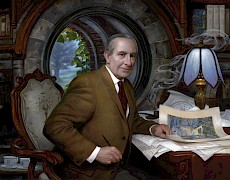☜ Click for full post text.
1. How were you introduced to Tolkien’s work?
As a kid and teenager, I was aware of Tolkien, but I never read it because the way people talked about it, it seemed like it was something that was daunting to get into, and that it was kind of a closed club, so I never got started with it. It wasn’t until I saw the film of The Fellowship of the Ring on opening night in 2001, and after the seven-minute prologue, I was in, and I knew that I wanted to learn everything there was to know about that world. In the year between the first two films, I read The Hobbit and The Lord of the Rings novel, and between the second and third films, I read The Silmarillion and Unfinished Tales. I really haven’t stopped since.
2. What is your favorite part of Tolkien’s work?
There are so many things, but if I had to break down to three things, it is the use of language, the metaphysical underpinnings, and the moral/ethical world that it exists in.
As far as language, Tolkien doesn’t write like anyone else, and his ability to use archaic words, in both denotation and connotation, is truly unique. He also has a poetic quality in his prose that is absent from most modern literature. You get the feeling that you are reading something both ancient and modern at the same time.
I’ve often said that I prefer the Ainulindalë to the Genesis account, or any other creation story for that matter, as it is not only having a feeling of mystical authenticity, but it also manages to capture the issues of good and evil, of fate and free will, and the different roles of divine and incarnate beings. And the metaphor of music as the mechanism of Creation appeals to me as a musician and sound engineer on a different level.
Lastly, Tolkien’s ability to explore complex issues of moral and ethical choices, including how good people go bad, the importance of both means and ends, and the importance of hope can not be more applicable to the modern world. I’ve often said that Tolkien not only makes you want to be a better person, but also shows you how.
3. What is your fondest experience of Tolkien’s work?
Back in 2003, I was going through one of the darkest periods of my life, due to a number of life crises happening at the same time. Reading through The Lord of the Rings during that time was one of the only things that helped me get through it. Losing myself in the lore of the Prologue and Appendices helped me forget my troubles, and I found hope for myself in those pages.
During that time, I also did my first readthrough of The Silmarillion, but I did it with the audiobook, which I highly recommend for first time readers. That language is really meant to be heard spoken aloud, like epic verse or scripture, so I felt like I really got it the first time around. It was also something that I lose myself in during that troubled time, and it helped me immensely.
4. Has the way you approach Tolkien’s work changed over time?
I have definitely taken a more academic approach over time and increased my reading of Tolkien’s work both in breadth and depth. I have now read all of the published and edited works at least once, and thanks to amazing academics like Drs. Corey Olsen, Mike Drout, Tom Shippey, Verlyn Flieger, and many others, I’ve been able to study so much of his work in great detail. I’ve also made a special effort to study Tolkien’s non-Middle-earth works, as I feel that these are really revealing of Tolkien’s character as a man, and the things that he was interested in life generally. Of course, I still read The Lord of the Rings and The Silmarillion once annually.
5. Would you ever recommend Tolkien’s work? Why/Why not?
Of course, and if for no other reason than that Tolkien is one of the greatest storytellers of the modern era. It’s obvious to me, going through the early drafts of his work, that despite both his and his observers’ emphasis on his fictional world-building, created languages, and so on, Tolkien really valued good storytelling above all else, which sets him apart from many other authors who have followed in his footsteps.
But also, I think in these current days we need Tolkien’s explorations of the nature of evil, its pitfalls and snares, and how we must face up to it more than ever, and I’ve often said that The Lord of the Rings is the greatest literary exploration of the nature of evil ever printed. I hope that more people can find the time to explore the world that Tolkien created, and how they can apply those experiences to their own lives.
You can find more from Tony Meade on Twitter!
